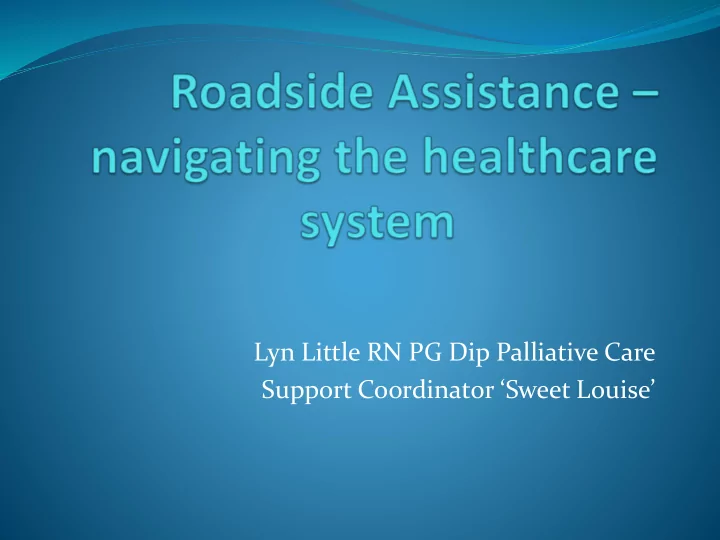

Lyn Little RN PG Dip Palliative Care Support Coordinator ‘Sweet Louise’
• Discuss some of the challenges of having a secondary breast cancer diagnosis • Identify key personnel who are available to provide support and assistance along the journey • Empower those with secondary breast cancer to know their rights and to employ them to improve their quality of life
• Past experience of the health care system comes into play • Knowing who is your main point of contact • Ensuring a smooth transition between different treatments • Receiving timely appointments and results of scans/tests • Knowing what is ‘out there’ to support you and your loved ones
• Family/whanau • General Practitioner • Oncologists(s) • Nurse Specialist or Care Coordinator • Oncology nurses • Psychologist/counsellor • Social Worker • Community based organisations
• Clinical Nurse Specialists -1996 funded by MOH specifically to coordinate the Breast Cancer pathway • Cancer Care Coordinators - 2012 $16 million over 4 years funded by MOH across all cancer streams in NZ • Palliative Care Nurses
• Single point of contact • Provide personalised supportive care • Coordinate appointments • Ensure you don’t fall through any cracks • Advocate on your behalf • Attend appointments with you • Provide specialist education and advice • Check clinical results • Refer to other supportive agencies
• • Social Worker Mental Health • • Counsellor / Psychologist Maori Health Services • • Oncology nurses Orthotics • • Physiotherapist/lymphoedema Prosthesis/wigs • • Dietician Sexual Health Service • • Occupational Therapist Hospice • • District Nurse Palliative Care Service • • Booking Clerk Kaitiaki • • Nuclear medicine Cancer Society Liaison nurse • Radiology
• Know your rights • Take the initiative • Employ all the resources at your disposal • Negotiate • Be resilient, determined, persistent, flexible, patient and kind!
Be aware of • ‘Your rights under the Code of Health and Disability Services Consumer Rights.’ Utilise • ‘Nationwide Health & Disability Advocacy Service’ • Midlands Region ‘Health Consumer Service’ • Health literacy resources
‘Let’s P.L.A.N . for better care’ • P = Prepare for your visit • L = Listen and share • A = Ask questions • N = Note down what you need to do next Health Quality & Safety Commission Oct 2014 .
P repare for your visit • Write down your concerns or questions • Take a list of your medicines, supplements or complimentary therapies • Take a support person or ask for a translator
Ask questions • What is my health problem • What happens next? • Why is that so important? • Are there any other options? • What can I do to help myself?
To Finish: Navigating the ‘system’ can be a challenge! • You are the Leader of your TEAM • Many people want to help you • Identify someone that ‘fits’ you • Their knowledge and support will help you face the challenge with confidence
Recommend
More recommend